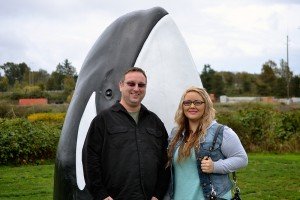By Steve Guntli
In 2013, two Blaine filmmakers set out to document the plight of the orca whale in the Salish Sea. Now, after a year of hard work and sacrifice, their film will be headlining the Friday Harbor Film Festival on Friday, November 4.
“Fragile Waters” is a 57-minute documentary film directed by Blaine residents Rick Wood and Shari Macy. Wood and Macy began shooting the film last winter, and have spent much of the last year gathering footage, conducting interviews and editing the film.
The Orca Network, a nonprofit organization dedicated to preserving orca habitats in Washington state, produced the film. The organization raised much  of the film’s modest $15,000 budget, and the unpaid filmmakers worked with a small volunteer crew to obtain hundreds of hours of footage for the hour-long movie.
of the film’s modest $15,000 budget, and the unpaid filmmakers worked with a small volunteer crew to obtain hundreds of hours of footage for the hour-long movie.
Wood and Macy brought two distinct perspectives to the film. Wood, who worked as a newspaper journalist in Whatcom County and Whidbey Island, approached the project from a more journalistic standpoint. Macy, a member of the Shuswap Nation with a background in television reporting for Northwest Indian News, was raised to respect the orcas, and brought a sense of spirituality and activism to the film.
“Orcas are such an iconic species in the northwest, and Natives have always had a close relationship with them and the Chinook salmon,” Macy said. “Without the Chinook, there would be no southern resident orcas, and they’re both going extinct. There’s a theme in our film that everything is interconnected.”
The film focuses primarily on the struggles of the southern resident killer whale, a subspecies of orca native to the Salish Sea, which has seen its numbers dwindle dramatically over the last several years, dropping over 10 percent in 10 years. Wood said there are currently only 79 known southern resident orcas alive today.
Southern resident killer whales are currently the only subspecies of orca on the endangered species list. The whales rely on Chinook salmon for 85 percent of their diet. With salmon runs declining due to changing weather conditions, pollution and many other causes, the southern residents have been dying out.
One of the most surprising things Wood and Macy found as their film came together is that there was no one place to lay the blame for the decline in population, and no one way to help restore it.
“There is no silver bullet,” Wood said. “There are no bad guys that we can point to. We chose to focus more on the heroes rather than trying to root out the villains.”
Some of their findings defied their expectations.
“A lot of people blame commercial fishermen for the decline in salmon runs, but the fishermen we spoke to were some of the most conscientious, sustainably minded people,” Wood said.
In the year they spent making the movie, Wood and Macy would meet a number of interesting and inspirational characters; everyone from politicians and environmentalists to a dog named Tucker that is trained to track whale droppings on the open sea. The pair shot footage from research vessels, under water and the air in an open-cockpit biplane.
“We came to learn that if we want to save the orcas, we just have to save ourselves,” Wood said. “We just have to do the things that will make our lives healthier and better, and everything will benefit.”
Wood and Macy’s film examines long-term solutions, such as reducing emissions and tanker traffic in the Salish Sea, as well as smaller short-term fixes such as opening sustainable salmon hatcheries, as possible ways to save the southern residents.
After their world premier in Friday Harbor, Wood and Macy hope to do a hometown screening at Blaine High School’s Performing Arts Center in early December. After that, the pair plans to continue their partnership and branch out into commercial, feature-length projects.
“It’s been an amazing experience,” Wood said. “We got support from everybody. Every person we went to immediately said, ‘How can I help?’”
For more information, visit the “Fragile Waters” website at fragilewaters.weebly.com, or visit its Facebook page at facebook.com/fragilewaters.
Comments
No comments on this item Please log in to comment by clicking here